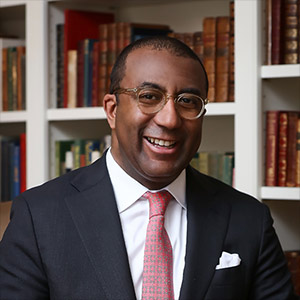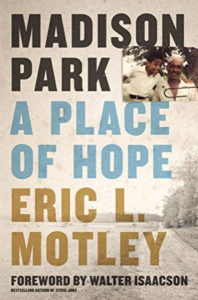Eric Motley

This past fall, several hundred people in Madison Park, AL glowed with pride when their native son Eric Motley published his memoirs. Eric was born to a single mother and raised by his grandparents in a town, he remembers as “a close-knit cocoon of several hundred self-reliant descendants of former slaves.” To me, Eric’s home town sounds like a dream come true or an offbeat version of Mayberry, or maybe a little of both.
As a boy, Eric was given the opportunities, love and attention that his biological parents and most residents of Madison Park never had. Aunt Shine, Old Man Salery and Reverend Brinkley are just a few of the characters who escorted Eric in his journey from a kid who was challenged by basic grammar in first grade to an erudite gentleman who collects rare books, serves on numerous boards and worked for a US President.
Today, Eric is the Executive Vice President and Corporate Secretary at the Aspen Institute, one of the nation’s most elite think tanks. In addition to running Institutional Advancement and Governance, Eric recently managed the search for the replacement for long-serving President and CEO Walter Isaacson. Since 2007, Eric has held many roles at Aspen, including Executive Director of National Programs, Managing Director of the Henry Crown Fellows Program and Executive Director of the Aspen-Rockefeller Foundation’s Commission to Reform the Federal Appointments Process.

Prior to joining the Aspen Institute, Eric served as the Director of the U.S. Department of State’s Office of International Visitors within the Bureau of Educational and Cultural Affairs. After receiving his Ph.D. from St. Andrews University, he joined the White House staff at the age of 27 and was the youngest appointee in the George W. Bush Administration. He became Special Assistant for Presidential Personnel in 2003, where he managed the appointment process in the White House for over 1,200 presidentially-appointed advisory board and commission positions. The office had a 100-person staff and a budget that exceeded $80 million.
Motley serves on numerous national and Washington, DC boards. He is involved in the arts and humanities and is a passionate book collector. His life story was featured in the Washington Post in 2006 as part of the series “Being a Black Man in America.”
Throughout the arc of his spectacular career, Eric has been motivated by lessons from his Madison Park upbringing in self-determination, hope and an unceasing belief in the American dream. He is guided by the philosophy to never turn away from a neighbor in need. With the pervasive divisiveness rampant in society today, Eric felt the need butt the tide and recognize the ties that bind us. So, he wrote a memoir to celebrate the people who came together to launch his success and to remind people of the power of community. If you would like to learn more about Eric, we (and Oprah and Southwest Magazine) highly recommend his memoir, Madison Park: A Place of Hope.
Q&A
- How did you get your name?
Unfortunately, there is no extraordinary story to tell. My mother heard the name Eric, perhaps through a friend or on television, and she liked it so much that she decided that I had to be an Eric. The same is so for my middle name Lamar, and of course I inherited Motley. Over the years I have come to appreciate that the name Eric Lamar Motley has a rather poetic sound and who could ask for better initials than “ELM”? - What did you want to be when you grew up?
In my earliest years, I assumed I would pursue the vocation of ministry. I was surrounded by so many ministers and priests that the monastic life of prayer, reflection and action consumed me. As I grew older those feelings and aspirations became translated into a desire to have a career in higher education. - What do you want to be now?
I am still trying to figure out what I want to do with the rest of my life. I have a very good and fulfilling job here at the Aspen Institute and my work is not finished here yet, but there are several more things I think I might want to do – ideas to pursue. I have yet to live fully into my calling. - If you could have a mulligan, what would you redo?
There were moments in my life, when I look back, where I moved so quickly with such intentionality, that I did not savor the experience fully for all it had to offer. I consumed much of it, but perhaps not all of it all the time. Perhaps that is an indication that I tried to do too much instead of prioritizing better. - What are you reading currently?
“Hamlet,” and I am reading a collection of verse by the Welsh poet, R.S. Thomas.
If you couldn’t live in America, where would you establish your home?
Perhaps London. It is such a culturally rich and diverse place that would in many ways satisfy a lot of my cultural and intellectual interests. - What is the biggest challenge ahead of you?
Fully understanding and living into the purpose for which I have been created. - Which living person do you most admire?
My childhood hero Dr. John H. Winston, Jr. continues to loom large in my life. He was the first black medical doctor I ever met, a person of incredible learning, and yet a life of such simplicity and humility. We still speak twice a month. - What is your greatest extravagance?
I collect rare books and its getting out of control! - Which superpower would you most like to have?
Flight. To fly and in and out like Superman! - You’re invited to a state dinner at the White House and cannot take your spouse/significant other? Who is your date?
My 7th grade teacher, Mrs. Susan Mayes, from Montgomery, AL - Assuming you had the talent, with what musical group/artist living or dead would you most like to perform?
The living opera vocalist, Jessye Norman and the now deceased pianist, Glenn Gould.
